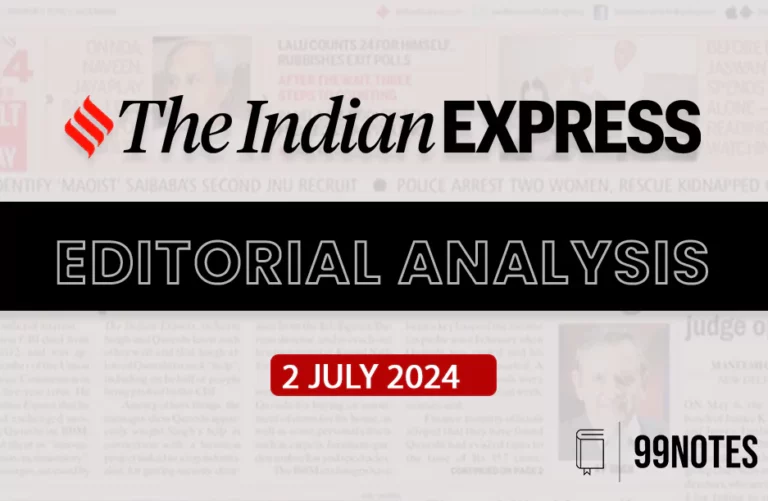17 September 2024 : The Hindu Editorial Analysis
1. Rights of future generations must guide climate debate
(Source – The Hindu, International Edition – Page No. – 8)
| Topic: GS3 – Environment |
| Context |
|
Introduction
- The United Nations will convene the Summit of the Future in New York on September 22-23, 2024, to address global challenges threatening humanity’s common future.
- The summit will focus on identifying multilateral pathways to combat issues like conflicts, climate change, pandemics, pollution, income inequality, and discrimination.
- The primary vision of the summit is to ensure a world where people can thrive with protection against these threats.
‘Future Generation Rights’ as the Central Theme
- Future generation rights will be a dominant theme, focusing on climate justice.
- The idea is to ensure that future generations inherit a world not blighted by the mistakes of the present and past generations.
- This theme raises a critical question: While there is a moral imperative to safeguard future generations, is there a legal obligation?
Debate on Legal Obligations to Future Generations
- A debate on the rights of future generations emerged in the European Journal of International Law in 2023.
- Stephen Humphreys, a scholar from the London School of Economics, published a provocative essay titled ‘Against Future Generations’.
- He argued that protecting future generations often diverts attention from the urgent responsibilities owed to the present generation.
- Governments may also prioritise present-day interests, even at the cost of environmental degradation, to ensure high living standards for their citizens.
Counter Argument in Defense of Future Generations
- A rebuttal to Humphreys was published by legal scholars from the Netherlands, India, and the U.S., titled ‘In Defence of Future Generations’, led by Wewerinke-Singh from the University of Amsterdam.
- These scholars argue that advocating for the rights of future generations offers a vision of justice and solidarity across time and space.
- They draw upon indigenous traditions, where caring for future generations is considered a sacred duty, often looking four to seven generations ahead.
Judgments Supporting Intergenerational Rights
- The article also cites several landmark judgments from around the world that emphasise intergenerational solidarity and environmental protection:
| Country | Judgment |
| Colombia | A court ordered the government to implement an “inter-generational pact” to protect the Amazon. |
| Pakistan | The Supreme Court barred construction in an environmentally fragile zone to protect future generations. |
| India | The National Green Tribunal upheld intergenerational equity in environmental matters. |
| Kenya | The High Court stated that the current generation is obliged to maintain natural resources for future use. |
| South Africa | The High Court emphasised intergenerational justice, mandating the state to consider the long-term impact of pollution. |
The Maastricht Principles on Future Generations’ Rights
- The Maastricht Principles on the Human Rights of Future Generations provide a clear framework linking sustainable development and climate justice to future generations’ rights.
- The Preamble asserts that human rights extend to all generations, present and future, with no temporal limitation.
- It also emphasises humanity’s continuous responsibility toward future generations, interpreting rights in alignment with natural systems and the best available science.
- The Maastricht Principles outline 36 guidelines to guide actions at national and global levels, such as:
- Protecting future generations from risks posed by public and private actors.
- Ensuring that future generations are represented meaningfully in decision-making processes that may affect their rights.
Planetary Overshoot Day: A Warning
- The concept of Planetary Boundaries serves as a critical measure of Earth’s capacity to sustain life. Eight out of nine planetary boundaries have already been breached.
- The Planetary Overshoot Day marks the date when humanity’s demand on Earth’s natural resources exceeds its capacity to regenerate them within the year.
- In 1970, Overshoot Day was on December 30.
- By 2024, it has moved to August 1, indicating that Earth’s resources are being rapidly depleted.
Conclusion: A Call to Action
- The current trajectory suggests a “rush to perdition”, threatening to leave future generations with a bankrupt planet.
- Urgent action is needed not only to protect those at immediate risk but also to avoid condemning future generations to a world scarred by environmental degradation, inequality, and neglect.
| Practice Question: Discuss the importance of protecting the rights of future generations in the context of global environmental challenges and intergenerational equity. (250 Words /15 marks) |
2. Women-led development in the Rajya Sabha
(Source – The Hindu, International Edition – Page No. – 9)
| Topic: GS2 – Indian Polity |
| Context |
|
Introduction:
- The concept of “women-led development” has been a cornerstone of the Indian government’s policies, especially highlighted during India’s presidency of the G20.
- Under this approach, women are not merely beneficiaries of development but also key participants in decision-making, actively shaping the agenda.
Women in the Indian Parliament:
- Vice President and Rajya Sabha Chairman, Jagdeep Dhankar, has introduced several progressive measures to promote women’s involvement in India’s legislature.
- Dhankar believes that women play a crucial role in the country’s economic development and governance.
Historic Measures in the Rajya Sabha:
- The passage of the Nari Shakti Vandan Adhiniyam (Women’s Reservation Bill), 2023 marked a historic moment.
- To symbolise the empowerment of women during this landmark change, Dhankar reconstituted the panel of vice-chairpersons to include only women.
- He also nominated four women members, constituting 50% of the vice-chairpersons’ panel.
Key Appointments:
- S. Phangnon Konyak, the first woman Rajya Sabha member from Nagaland, presided over the House.
- P.T. Usha, a distinguished athlete, became the first nominated MP to serve as a Vice Chairperson of the Rajya Sabha.
G20 and Women Empowerment:
- Under India’s G20 presidency, the New Delhi Leaders’ Declaration stressed the importance of investing in the empowerment of women and girls.
- The declaration highlighted that empowering women leads to progress towards Sustainable Development Goal (SDG) 5.5, which ensures women’s participation and leadership in decision-making processes.
Initiatives in the Rajya Sabha Secretariat:
- Dhankar initiated several reforms to promote gender balance in the Rajya Sabha Secretariat.
- Traditionally male-dominated roles, such as House duty, now include women officers.
- The Vahan app was introduced to ensure safe commuting for women officers working during late hours.
- Women have also been appointed as chamber attendants, leading to greater representation of women MPs.
Prominent Roles for Women Officers:
- Women officers now hold key positions in the Secretariat, handling important responsibilities in human resources, the legislative section, and the capacity-building division.
- Some women are officiating in Parliamentary Standing Committees, and even senior positions in the security services have been filled by women.
- A woman officer has been appointed as a master trainer for the iGOT-Karmayogi Bharat initiative.
Recognition and Support for Women Officers:
- Dhankar has promoted the recognition of top-performing women officers across all services in the Rajya Sabha Secretariat.
- Gender sensitisation workshops and talks have been conducted to foster a culture of gender parity.
- Women’s Day celebrations in the Secretariat provide opportunities for women officers and employees to showcase their talents.
Encouraging Engagement with Academia:
- In a move to bridge the gap between academia and the legislature, Dhankar invited interns from Miranda House in Delhi to participate in a 15-day course on parliamentary procedures.
Conclusion:
- The Rajya Sabha, under Dhankar’s leadership, is setting a strong example of translating the concept of women-led development into reality.
- These initiatives can inspire other legislatures across India to follow suit, promoting greater gender equality in governance and decision-making roles.
| PYQ: “Though women in post-Independent India have excelled in various fields, the social attitude towards women and feminist movement has been patriarchal.” Apart from women education and women empowerment schemes, what interventions can help change this milieu? (250 words/15m) (UPSC CSE (M) GS-2 2021) |
| Practice Question: Discuss the significance of the Nari Shakti Vandan Adhiniyam (Women’s Reservation Bill), 2023, in empowering women in the Indian Parliament. How do recent initiatives contribute to women’s leadership in governance and decision-making? (150 Words /10 marks) |



